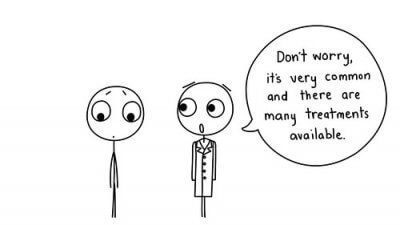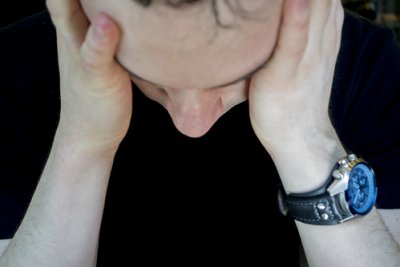Erectile Dysfunction and Mental Health – What Helps?
by Anne Frier

By: studio tdes
Erectile dysfunction (ED) can be difficult to talk about, but is an issue across age groups.
And while it can be treated with medication and the mental health aspect ignored, this approach can lead to slower recovery or other long-term issues.
How common is erectile dysfunction?
It seems that numbers are on the rise when it comes to erectile dysfunction.
A 2002 review of research across four continents placed ED as affecting only 2% in men younger than 40, but rising to 86% in men 80 years old and over (1).
But by 2011, an Europe-wide research review revealed that up to 28% of men between 18 and 40 had ED issues. This was echoed by a 2014 study in Canada that concluded 24% of men aged 16 to 21 had ED difficulties. (2,3)
Isn’t erectile dysfunction a physical issue?
It can be related to medication, which adds to the reason it is more common in older men who are more likely to be taking medication.
And there is an age component. Older men do need more stimulation to have an erection and need more time between erections.
In younger men with erectile dysfunction, it can be caused by narcotics abuse, alcoholism and certain rare diseases.
Erectile dysfunction and psychology

By: jseliger2
Performance anxiety is definitely a contributing factor.
Once men have first noticed erection problems, they often obsess about it during sex, and their worries affect future erections. In young men, it can be worries about being new to sex, or to a partner.
Does performance anxiety play a part even if ED is a result of natural ageing? Typically the result of long-term damage to blood vessels, erectile dysfunction makes slow, gradual progress.
The associated mental distress it brings, on the other hand, can take effect much faster. It can effectively shorten the time from first noticing an erectile problem to complete flaccidness.
On the upside, this psychologically reinforced side to ED can be helped.
The truth about growing numbers of young men with ED?
The rise of readily accessible internet porn in the past two decades is driving ED problems in younger generations.
There’s now a vast amount of literature on the subject. This includes Gary Wilson’s insightful book Your Brain on Porn: Internet Pornography and the Emerging Science of Addiction.
The bottom line is that the brain is overstimulated by excessive porn use (greater than one hour daily) and requires ever greater stimuli to release dopamine and trigger sexual arousal. ‘Vanilla’ sex with a partner then no longer does it for the brain, and the penis stays soft.
The good news is that several months of porn abstinence can restore a man’s libido. Of course porn, like any addiction, is difficult to just ‘cold turkey’. Support, such as counselling, is suggested.
What can help if you are struggling with erectile dysfunction?
1.Communicate with your partner.
Sit down with your partner and talk frankly about your ED issue, and the associated mental stress and feelings of shame or guilt you may have. Also seek to better understand what your partner considers a fulfilled sex life. Most likely, you’ll discover that you have to throw out some of your earlier assumptions.
2. Get creative.
Explore new aspects of sex together, by expanding the foreplay and relishing the emotional intimacy of the act more deeply. For both partners there are many roads to a fantastic orgasm (even older men with complete erectile dysfunction can still enjoy orgasms).
Broadening your understanding and scope of sex will take away the focus from intercourse, making it more of an optional side show rather than the obligatory end of all sex.
3. Apply mindfulness.
Aspect of mindfulness have been successfully applied to sexual problems for a long time, well before “mindfulness” was coined as a term. William Masters and Virginia Johnson developed a sex therapy in the 1970s called “sensate focus”, where partners are asked to focus on their senses and sensations during sex, rather than thinking about the goal of having an orgasm.
Recent research on mindfulness therapy for ED includes a 2018 pilot study at the University of British Columbia, led by Lori Brotto, author of Better Sex Through Mindfulness. The study found that mindfulness therapy can help men with situational, psychologically-induced ED. (4)
Mindfulness applied to ED means that calm awareness of the present moment helps block performance anxiety or other negative thoughts creeping in. You’ll learn better accept your sexual state and note details you bypassed before, like how nice your partner smells, the feel of skin, or sensation of touch.
Not sure you want to learn mindfulness alone? You can also work with a a mindfulness-based therapist.
[Not even sure what mindfulness is? Use our easy how to “Guide to Mindfulness“.]
4. Consider CBT therapy
Cognitive behavioural therapy means cognition (your way of thinking) is used to identify and change negative thoughts, attitudes and behaviours. And there are CBT therapists who specialise in erectile dysfunction.
CBT can also help you overcome porn addiction (and thereby resolve the accompanying ED issues).
5. Go to couples counselling together.
Many health professionals helping patients with restoring penile erection favour a holistic approach with patient and partner involved, over just focusing on erectile dysfunction as an isolated issue.
That said, the study at Queen’s university in Canada found that less than 10 per cent of clients offered counselling took the opportunity. To their detriment. As the study explains, even if the ED got better, serious relationship problems remained.
“Once the recovery of erectile function takes place, major changes may occur in relationship dynamics. The present study showed that a large percentage of partners were either indifferent or unhappy about future sexual activity. These attitudes of the partners will undoubtedly present new conflicts in relationships with pre-existing problems.”
A few sessions of couples counselling can greatly improve communication skills between partners, teaching them how to better listen and express themselves. It can help avoid the relationship falling apart even if your erectile dysfunction improves.
Ready to seek support for yourself and your relationship? We connect you with some of London’s most highly regarded psychotherapists and counselling psychologists. Not in London? Use our booking site to find a registered therapist near you, or an online therapist you can chat to from anywhere.
Still have a question, or want to share your experience about ED recovery? Post below. Comments are monitored to protect our readers.
 Anne Freier is a medical and science writer. She has an MRes in Biomedical Research and a MSc in Neuroscience & Neuropsychology.
Anne Freier is a medical and science writer. She has an MRes in Biomedical Research and a MSc in Neuroscience & Neuropsychology.
References:
- Prins, J., Blanker, M., Bohnen, A. et al. Prevalence of erectile dysfunction: a systematic review of population-based studies. Int J Impot Res 14, 422–432 (2002). https://doi.org/10.1038/sj.ijir.3900905
- Park, Brian, et al. “Is Internet Pornography Causing Sexual Dysfunctions? A Review with Clinical Reports.” Behavioral Sciences, vol. 6, no. 3, 5 Aug. 2016, p. 17, 10.3390/bs6030017.
- JC Lee, DHC Surridge, A Morales, JPW Heaton. Erectile dysfunction: The perspectives of patients and partners on counselling. J Sex Reprod Med 2002;2(1):11-15.
- Bossio, Jennifer A, et al. “Mindfulness-Based Group Therapy for Men With Situational Erectile Dysfunction: A Mixed-Methods Feasibility Analysis and Pilot Study.” The Journal of Sexual Medicine, vol. 15, no. 10, 2018, pp. 1478–1490, www.ncbi.nlm.nih.gov/pubmed/30297094, 10.1016/j.jsxm.2018.08.013.






I had a very strong sex drive, often having sex daily, In my youth. I could orgasm 4 times a day having sex. This tailed off in my early forties to around twice a day but a day or so for recovery. So it does fade with age. But I do hear of 70+ men still wanting and being able to have sex regularly if they have a willing partner.
I had a RTA when I was 45 and was hit on the head. I`m sure the opioid medication affected my erections. I`m not convinced it was a head injury that caused me to lose them. I was relaxed and happy but seem to lose interest in sex. I then went through a period of extreme stress 6 months later and seemed not able to maintain an erection. This then became an anxiety, which made performance worse. I got into a relationship after being single but got ridiculed for my lack of sex drive. I`m quite sure a lot of this was performance anxiety related because when I got into a very loving relationship and fell in love again my erections returned, maybe not 100% but 90 % hardness but on occasions it was 100%. This culminated in having sex 9 times in 7 days whilst on holiday at 50 years old, so it proves the right environment and partner helps! I also noticed some days I felt normal sex drive and others it just tailed off again, so fluctuating libido. So clearly there is a huge psychological factor, poor self image issues, stress hormones, having the right partner. I`m guessing that this is the case unless there is an underlying medical condition or age related issue.
I had also stopped smoking when I was 47, gave up drinking, excess sugar in my diet and a walking/gym routine. In fact I noticed after I had walked 6 miles etc I started to get automatic erections and morning erections just like when I was young.
So these things can improve. Get fit, get loved and get in the mood. My partner and I used to bath together, not a pretty sight but relaxed us. But now the issue is her menopause and lack of interest in sex! Life eh!
Thanks for this excellent share! Which will definitely help other readers. The part about how a partner can be part of it is really relevant, we found it fascinating that the one study discovered most partners of those with ED didn’t want sex and blamed all relationship problems on ED, then refused to go to couples therapy – which surely would mean it was adding to/creating the issue?! Yes, ‘get loved’ from others and with self-care, sounds about right. And yes, the menopause is a game changer. Maybe it all levels out and matches in the long run ;). Best, HT
Hi Anne,
First of all; great post.
As a counsellor who works with men and indeed men who struggle with erectile dysfunction, I firmly believe that having a conversation about the issue is a practical way forward. Many men find it difficult to talk to their partner about the problem which creates anxiety in the relationship and can lead to frustration and anger. I often find that men come to me because they simply don’t know how to talk to their partner about their problems, particularly something as sensitive as erectile dysfunction.
I’m a person centred therapist and while I’m sure CBT can help men with erectile dysfunction, I find that talking about the problem and perhaps exploring where the anxiety comes from is the best way forward; I certainly believe it works for my clients.
Keep up the good work!
Kieran.
Hi again Kieran, thanks for the comment. We don’t publish comments with links, unfortunately, so yours has been taken out. Otherwise we’d be endlessly spammed by every therapy service and competitor in the UK. If you’d like a link on the site, as suggested on your other comment you can write an article for us and we offer an author box with links in return. Otherwise feel free to join our booking site as a therapist, we offer a platform for UK-wide registered therapists here https://harleytherapy.com/. Best, HT.
Hi there,
sorry, I couldn’t see a response to my comment when I last looked on the other post but having just checked again, I can now see a response. Apologies if leaving a link is in bad taste, I had seen it done elsewhere but now you’ve explained I can see it from your point of view. Thanks for clarifying. I do enjoy blogging, so perhaps an article would be a more suitable! I have also joined as a therapist. It’s a great platform that’s really easy to use. I’m sure it’s very use friendly for clients too.
Warmest regards,
Kieran.
Kieran, no problems at all, and the comment was useful to readers.
simple trick to cure ed